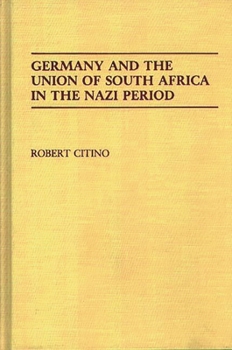Germany and the Union of South Africa in the Nazi Period
This is the first study to examine Nazi German foreign policy towards the Union of South Africa from 1933-1939. Making extensive use of unpublished primary source German documents, Robert Citino focuses on the activities of the German embassy and consulates within South Africa in order to answer four basic questions: What role did race and racial theory play in German foreign policy towards South Africa? Did Germany attempt to exploit South African yearnings for international respect, and, if so, how? Did the Germans seek to take advantage of deep divisions within South African society between British and Afrikaners? Finally, to what extent was the German Foreign Office Nazified in the 1930s? By concentrating on the policies and views of German diplomatic personnel within a single country--rather than on Hitler's grandiose proclamations and speeches on world affairs--Citino offers a closer look at Nazi German foreign policy operations than is usually available.
The study is organized chronologically and begins with an overview of German-South African relations before 1933. Subsequent chapters address early tensions and South African domestic developments in the years leading up to the outbreak of war. Specific topics covered include the role played by the former German colony of Southwest Africa in relations between the two states, the hostile attitude of much of the South African press towards Nazi Germany, the boycott of German firms by the South African Jewish community, the Smuts-Hertzog fusion, the rise of Malan and his Purified nationalist party, the growth of anti-Semitism in South Africa and the concurrent growth in Afrikaner national consciousness, and South African attitudes towards the major European crises of the 1930s. Citino concludes by analyzing Germany's inability to keep South Africa neutral in 1939 and the entry of the Union into the war at England's side. Students of modern German, South African, and twentieth century diplomatic history will find Citino's work an enlightening contribution to the literature of Nazi Germany's foreign relations.




